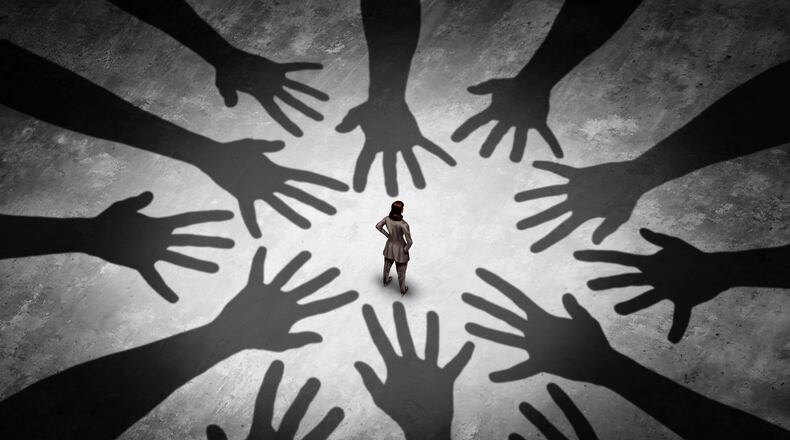How can Georgia transform its dangerously inadequate patchwork of child mental healthcare into a functioning whole?
Finding a solution, we acknowledge, won’t be easy.
But the somber figures demand that we must do more – and quickly.
In 2021, at least 119 children and teenagers in Georgia took their own lives. And one in eight teenagers in our state say they have “seriously” considered suicide within the past year.
Yet, as we wrote in an editorial earlier this month, “The state’s piecemeal mental health care system is failing to serve the growing number of depressed and suicidal children in Georgia.”
Thankfully, there is broad recognition that improvements must be made. And efforts are underway to begin addressing this crisis.
But safeguarding the future of our young people shouldn’t be beyond our reach.
The children of Georgia need our help.
We focus here on a pair of areas where Georgia’s current shortcomings in child mental healthcare seem most apparent. We’ll characterize them as regulation and rooms.
For years, many people working on this issue have believed Georgia has too few inpatient beds to accommodate young people suffering from serious mental health conditions.
Children’s Healthcare of Atlanta, the only freestanding pediatric health system in Georgia, does not have inpatient beds. Neither does The Children’s Hospital of Georgia, which is part of the Augusta University Health System.
State Rep. Sharon Cooper, R-Marietta, is chairwoman of the House Health and Human Services Committee. She holds a master’s degree in nursing, and has written two textbooks on psychiatric nursing.
In our investigative report, “Children in Crisis,” published in October, Cooper challenged Children’s Healthcare of Atlanta to “put mental health on parity with physical health.” State Rep. Mary Margaret Oliver, D-Decatur, said in that same story that “I want them to do more, and there are many other people in Georgia that want them to do more for the children who are in crisis, based on mental illness.”
For its part, Children’s has announced significant investments in pediatric mental health – in areas other than inpatient beds. It says it will spend at least $112.5 million over the next five years to build a robust system of outpatient services intended to prevent troubled kids from reaching a crisis point.
In June, Children’s announced its new chief of Behavioral and Mental Health. The pediatric health system also says it has hired more than 130 professionals in the last two years, including psychiatrists, nurses, social workers and techs.
As for inpatient care, Children’s, which is building a $1.5 billion hospital for “transformative pediatric care,” says such treatment is best provided elsewhere. Dr. Daniel Salinas, the chief community clinical integration officer for Children’s, said in an October news story that, “We think kids are better served by the specialized psychiatric expertise that is found in many of the facilities across our state, and we work closely with those facilities.”
Given serious problems at some of those places uncovered by The Atlanta Journal-Constitution, this seems far from an optimal solution for Georgia’s children.
That is why we’re asking state lawmakers to figure out why Children’s of Atlanta and Augusta University Health are not doing more, including operating their own inpatient units.
In fairness to healthcare systems, pressing for adequate answers can’t happen in isolation. The solutions will likely involve far more than just hospitals.
Who pays for what – how much, and for how long – is a critical question that affects what mental health services are offered and where, from patient rooms to outpatient therapy and ongoing care.
It seems clear that Georgia and even private insurers pay too little overall to adequately fund a necessary baseline of mental health services.
And the serious, at-times life-threatening, shortcomings at existing psychiatric hospitals, many of them designed to serve adult patients, points to the state’s deeply inadequate regulation of such places.
If, as Children’s executives say, specialized mental health institutions should remain part of the overall care picture here, then they must be properly and consistently overseen by the Georgia Department of Community Health.
Yet, our reporting has shown that the agency has fallen woefully short in regulating care facilities and enforcing needed changes. Even as it fails at the basics of safeguarding those in need, DCH has remained stunningly non-transparent as to what exactly it is doing.
All of which brings us back to the broader question: Just how can we knit together a well-functioning and effective system of mental health care for Georgia’s children?
There are some intriguing ideas out there that deserve serious consideration.
Forsyth County, for example, is planning to build a safety-net facility that will include a mental health unit with 10 crisis stabilization beds for children. Forsyth’s former county manager is Kevin Tanner, who now leads the state agency serving Georgians with mental illness.
We must also remember that hospitals in other cities are adding inpatient and outpatient treatment capacity.
This is necessary work, given the increase in need for such services.
Remembering that youth suicides here have doubled in the last decade, the life-and-death task now before Georgia’s lawmakers, healthcare providers and insurers is clear.
It won’t be solved by important players hunkering down in their silos.
Instead, what we need is a seamless, comprehensive and well-regulated network – one that can save the lives of Georgia’s children.
We cannot fail them any longer.
The Editorial Board.
Keep Reading
The Latest
Featured


